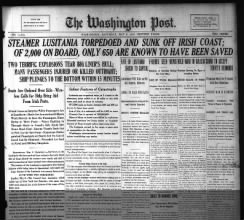 |
|
An ocean liner can be a hazardous vessel for travel in wartime. Yet, in the early 20th century, there was no other way to get from one side of the Atlantic to the other. During World War I, German submarines prowled shipping lanes, looking for transport and munitions ships to attack, suspecting that even passenger ships carried war materials from the U.S., a neutral country, to Great Britain, Germany’s enemy. The perils of crossing the ocean in wartime were well known as noted in August 1914 when several newspapers, including The Washington Post, reported that the Lusitania was “dodging German cruisers.” On May 7, 1915, the RMS Lusitania did not dodge so effectively. The ship was spotted by a German U-boat off the coast of Ireland, hit by a torpedo, and sunk within 18 minutes. Of the 1,959 on board, 1,195 lost their lives, including 123 Americans. The ship’s captain, William Turner, survived and received much of the blame for not following the recommended protocol for avoiding German subs. The tale is best told through contemporary accounts. A photo of the Lusitania in better days, along with a lengthy headline declaring that “a grave crisis is at hand,” plus several smaller yet related articles, was published in The New York Times. What we know today about the sinking of the Lusitania is a bit different than the breaking news of 1915. Yet, the speedy and timely reporting is remarkable and quite accurate for the era. Explore these news headlines and related stories on Newspapers.com.
|



